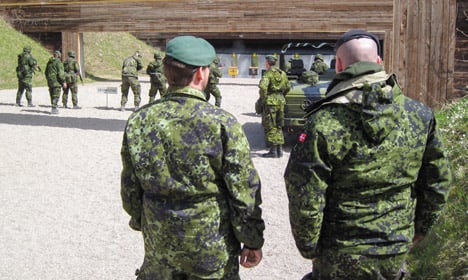MILITARY
Copenhagen attacks spur Home Guard interest
Interest in enrolling in the Danish Home Guard doubled in the week after a gunman opened fire at a cultural centre and killed a Jewish security guard, recruitment officials said on Friday.
Published: 17 April 2015 15:50 CEST

Interest in the Home Guard increased after both the Paris and Copenhagen attacks. Photo: Colourbox
February’s twin shooting attacks in Copenhagen have led an increased number of Danes to consider enrolling in the Danish Home Guard (Hjemmeværnet), Jyllands-Posten reported Friday.
Following the attacks, in which 22-year-old Omar El-Hussein killed a filmmaker at a cultural centre and a security guard at a synagogue, the number of Danes who filled out contact forms on the Home Guard’s website was double its average over the past five months.
A similar spike in interest was registered after the January terrorist attacks in France.
“Our recruitment site saw an immediate effect after the attack and Paris and later in Copenhagen. There was a clear increase, the type of which we normally only see when we run campaigns,” Tuf Krenchel, the head of Home Guard recruiting, told Jyllands-Posten.
The Home Guard normally receives an average of 27 recruitment inquiries per week, but in the week after the February 14-15 Copenhagen shootings, 85 Danes signed up. In the first week following the Paris attacks, 40 Danes contacted the Home Guard. An additional 75 signed up the following week.
“I think it is natural that people react in different ways when they suddenly feel that their country and society is under attack. Some want to take concrete action and for them the Home Guard is a way to support the military and protect society,” Krenchel said.
The Home Guard recruitment process takes up to four months and some who expressed interest may later withdraw, but Krenchel said he was confident that the Home Guard would see a membership boost.
“I am sure that the increased interest in one way or another will lead to an increase in member numbers,” he said.
One of the weapons that El-Hussein used was an M95 rifle that had previously been stolen from the home of a Danish Home Guard member. That led the military service to order its 4,300 volunteer members in March to turn in their rifle bolts, making them unable to be fired.
That decision led to a mixed political response. While Defence Minister Nicolai Wammen expressed his “full trust” in the Home Guard, many opposition MPs criticized the decision.
“When one hands in their bolt, it’s the same as handing in their weapon. So it is basically saying that now our Home Guard is unarmed. I think that is the wrong decision,” Danish People’s Party spokeswoman Marie Krarup told DR.
Troels Lund Poulsen, a spokesman for primary opposition party Venstre, told Berlingske it was “insane” to implement what he characterized as a drastic decision, while Holger Nielsen of the left-wing Socialist People’s Party countered that disarming Home Guard members was “sensible”.
A confidential report revealed on Tuesday that, despite prison officials warning of his growing"extremism", El-Hussein was moved into a cell with an open Isis sympathizer.
Five men charged with helping El-Hussein obtain and get rid of weapons were last month remanded in custody for an additional four weeks.
Url copied to clipboard!


 Please whitelist us to continue reading.
Please whitelist us to continue reading.